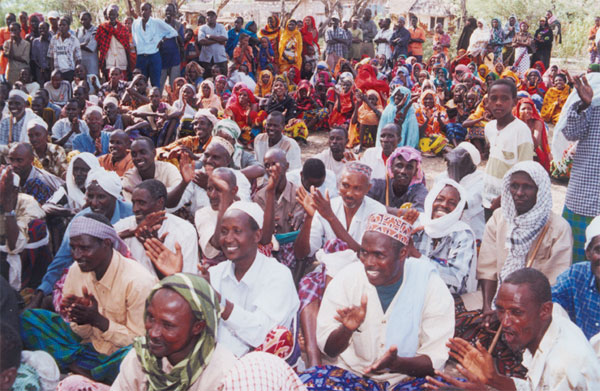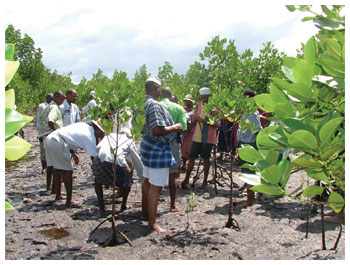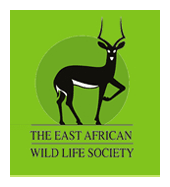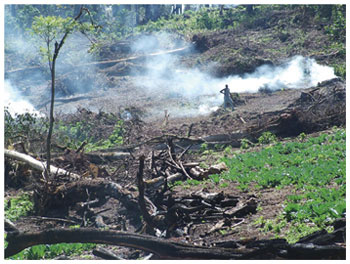

The East African Wildlife
Society : Conservation is our concern
More
on page two
 The
East African Wild Life Society (EAWLS) is a
not-for-profit NGO and membership society,
committed to conservation and the wise use of
nature. Established in 1961, EAWLS incorporates
members of the wildlife societies of Kenya and
Tanzania, along with Ugandan conservation
enthusiasts. Together members from the three
countries decry the extinction of both wildlife
species and their habitats.
The
East African Wild Life Society (EAWLS) is a
not-for-profit NGO and membership society,
committed to conservation and the wise use of
nature. Established in 1961, EAWLS incorporates
members of the wildlife societies of Kenya and
Tanzania, along with Ugandan conservation
enthusiasts. Together members from the three
countries decry the extinction of both wildlife
species and their habitats.
The East African
region is fraught with numerous environmental
problems such as deforestation, loss of
biodiversity and habitat, pollution, invasive
species, expansion of mono cultural crops, high
population growth, and poverty. Inappropriate
land use policies and over exploitation of
resources have caused severe environmental
degradation. In seeking solutions to the
problems facing the region, it is important to
address the underlying causes and not just their
symptoms. This is the background against which
the EAWLS was formed.
The mission of
EAWLS is "to promote conservation and the wise
use of the environment in East Africa." In order
to realise this mission, the EAWLS works in
close collaboration with like-minded
Non-Governmental Organizations and local
communities, institutions within government and
intergovernmental agencies in programmes such as
Endangered Species Conservation, Forests and
Water Catchments Conservation, Wetlands
Conservation, Marine and Coastal Resources
Conservation, Community Wildlife Conservation,
Conservation Education and Advocacy, Natural
Resource Policy Review, Grassroots Institutional
Capacity Enhancement, and Forums: including
Kenya Marine Forum, Taita Taveta Wildlife Forum,
Kenya Wetlands Forum etc and also Field Project
Support.
 The
objectives of the EAWLS are to:
The
objectives of the EAWLS are to:
• Influence
policy and legislative reviews and reforms
through advocacy and lobbying.
•
Facilitate popular stakeholder support through
research, education and awareness creation,
networking and communicating.
• Promote
and facilitate community conservation
initiatives at different biomes that enhance
ecological and livelihood systems.
The
EAWLS History
Through out the
1980s, the EAWLS used advocacy and publicity
effectively as weapons to fight against the
rampant poaching affecting the region. The
society played a major role in initiatives
undertaken for the conservation of elephants,
and the establishment of rhino sanctuaries in
Kenya. Donations helped fund rhino sanctuaries
in the Aberdares, Lake Nakuru and Ngulia in
Tsavo West. These sanctuaries have helped build
rhino numbers in Kenya, now estimated at
500.
The EAWLS also
campaigned strongly for an international ban on
ivory trading. After the ban was enforced in
1989, ivory prices dropped dramatically and
ivory poaching throughout Africa declined. The
EAWLS will continue to support the ban until
such time we are sure that a continued ivory
trade will not cause a resumption of massive
poaching as previously witnessed.
During this
time, the EAWLS was also instrumental in
advocating for the establishment of a quasi
government institution to run national parks and
reserves in Kenya. This effort resulted into the
establishment of the Kenya Wildlife
Service.
 Awards
Awards
Through the
years, the EAWLS has been the recipient of a
range of awards in conservation. These
include:
•
Environmental Leadership Award 2005, presented
to Mr. Hadley Becha (Deputy Director; Head of
Programmes) by the East African Environment
Network in recognition and appreciation of his
outstanding contribution to environmental
conservation in Eastern Africa.
• 1st Prize
Peter Jenkins Award for conservation writing,
presented to Dr. Imre Loefler, Chairman EAWLS,
March 2005 for his written contributions in
support of conservation.
• Buffet
Award for Leadership in African Conservation,
December 2004, presented to Mr. Ali Kaka
(Executive Director) by the National Geographic
Society of Kenya.
• Silver
Award Winner 2004, presented to the Kenya Forest
Working Group (an EAWLS Sub-Committee) by the
Total Eco Challenge, in recognition of
information dissemination with regard to trees
and forests.
Currently, the
EAWLS is seen as a leader in building the
capacities of Community Based Organizations in
conservation. The main aim is to enable these
organizations to mobilize funds and resources,
and have the necessary technical skills and
organizational capacity to effectively manage
natural resources in their respective areas. The
Society provides a forum for the regional
community to understand how to achieve
sustainable environmental management and
community benefits from wildlife and the
environment.
Membership
The most
important component of the organisation,
membership to the EAWLS is open to all persons
who support its objectives. Members include
individuals and organizations that are proud to
give something back to the environment.
Membership is valid for one year. Over the past
forty years, EAWLS members have invested more
than 2 million dollars in over 1000 conservation
projects through out East Africa.
Some of the
benefits of joining the EAWLS include:
Certificates of recognition for our corporate
members, Free entry to the EAWLS monthly talks,
free access to the library, 10% discount on all
the unique items offered at the EAWLS gift shop,
free updates on conservation issues through our
informative monthly e-newsletter, up to 4 copies
of our world renowned conservation magazine,
Swara, and an opportunity to partner and
participate with us in fulfilling our vision
which is "working towards an East Africa where
all people can enjoy the full diversity, beauty
and richness of nature".
Membership
boosts the EAWLS status as a respected
conservation body representing a wide spectrum
of conservation stakeholders, many of who have
initiated conservation programmes. The EAWLS
capacity to embark on campaigns to halt forest
excisions and unsustainable development projects
in wetlands in Kenya is strengthened by
increased membership.
Information
Exchange Platform
The EAWLS holds
talks on the second Thursday of each month.
These talks are a mixture of discussions and
film shows presented by versed speakers from
different fields. Conservation issues are
discussed and members/participants have a chance
to question and debate them. These forums are
very popular and are open to all. The talks are
not restricted to conservationists and all
stakeholders whose activities have a direct or
indirect impact on the environment are welcome
to participate. Technocrats such as agronomists,
industrialists, economists and socialists also
participate in the talks and try to strike a
balance between conservation and
development.
Projects
and Sub Committees
The EAWLS
started running hands-on projects in the early
1990s. The conservation projects are implemented
within East Africa with special emphasis on
Kenya. The EAWLS has also established
sub-committees for undertaking special
tasks.
Some of the
projects are long term (two to four years) while
others are one-off activities and may be as
short as one-day workshops. Different donors
fund some projects in phases whereas others are
collaborative, involving the EAWLS and other
organizations. Some projects have run their term
while others are still in the development stage.
These projects have made major contributions to
the conservation of nature in the region. For
more information on past and present projects,
please visit www.eawildlife.org
Gift
Shop
The EAWLS runs a
gift shop that offers unique merchandise such as
baskets, jewellery, sculptures, carvings,
paintings, cards and clothes from different
communities involved in our conservation
programmes. Also available, are emblazoned
articles such as glasses, T-shirts and badges;
all proceeds from here are channelled towards
various conservation projects. This a great
avenue through which the EAWLS promotes
conservation by selling products made from
recycled materials and raw materials such as
hyacinth and elephant dung, thus reducing over
reliance on forest products. Members of the
EAWLS get a 10% discount on all goods
purchased.
Library
The EAWLS
library is stocked with a wide collection of
both written and audio-visual materials. It
offers an expansive variety of books and reports
on wildlife, our environment, nature magazines,
and research theses, reports on on-going
projects as well as wildlife videotapes and
films. Also in stock, are videos by
world-renowned wildlife film producers on
topical issues of interest to conservators and
members of the public. The library offers free
research access and subsidised rental services
to members.
Publications
The EAWLS boasts
three highly rated regular publications. These
are:
Swara Magazine:
This quarterly wildlife and conservation
magazine enjoys global readership, and is
recognized as among the best wildlife magazines
in the world, and certainly the best in the
region.
African Journal
of Ecology: Another quarterly publication that
compiles results of scientific research papers
and comprehensive reviews, which make a
significant contribution to the ecology of the
African flora and fauna. Published for EAWLS by
Blackwell Publications, AJE is recognized
worldwide as an authoritative research
journal.
eawls.news: A
monthly e-newsletter that informs members on
Society activities, especially the on-going
projects and provides a forum to express their
views and opinions on topical issues in the
region.
The EAWLS also
participates in addressing emerging issues
concerning the environment.
The East African
Wildlife Society has been at the forefront of
conservation of wildlife species and their
habitats, fighting the forces that threaten to
bring imbalances to our ecosystems. By becoming
a member of this auspicious organization, one is
able to participate in the battle to safeguard
our environment and its resources for our
benefit, and the benefit of future
generations.
E-mail:
info@eawildlife.org
If
you would like to join the EAWLS and help
support conservation in East Africa, log onto
www.eawildlife.org
and fill out the membership form on the secure
EAWLS website'

 ..
..
 ..
..